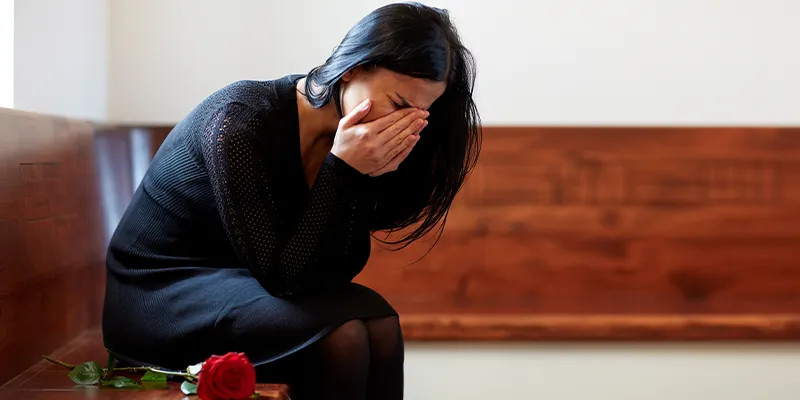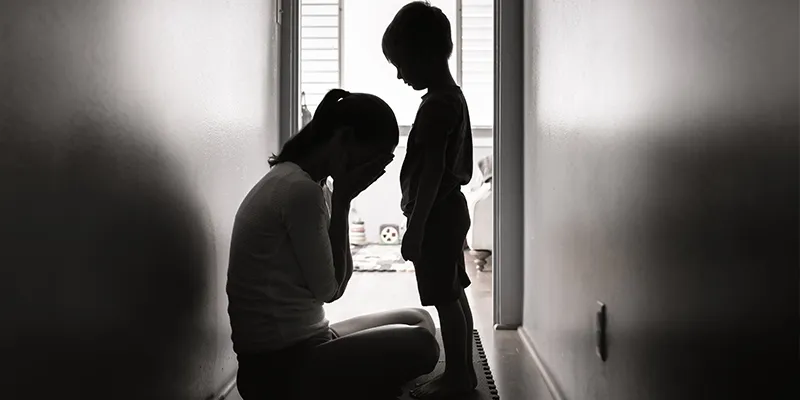Dealing with loss, grief and anxiety amid COVID-19
The second wave of COVID-19 has wreaked havoc across India, bringing death and devastation to many families. The country’s total death toll stands at 2,49,992, as per government data.
As the deadly second wave of the COVID-19 pandemic rips through India, almost no one remains unaffected. There is death, disease and devastation everywhere. As per government records, the death toll stands at 2,49,992; the actual figure is likely to be higher. The overwhelming rise in the number of infections has brought the country’s healthcare system to its knees, with a serious shortage of hospital beds, medicines and oxygen. This has understandably led to a sense of fear and anxiety. According to Union Health Ministry data, the total number of reported cases stands at 2,29,92,517.
YourStory Founder and CEO Shradha Sharma caught up with Dr SK Chaturvedi, psychiatrist and former Dean, National Institute of Mental Health & Neurosciences (NIMHANS), to understand how the second wave is affecting people’s mental health.
Dealing with loss
“A loss of a loved one is called bereavement, the psychological reaction is called grief, and the social reaction to that is called mourning,” says Dr Chaturvedi.
In the current scenario, grieving and mourning have become much more challenging.
Typically when there is a death, family and friends gather in support, there are last rites, and there is a sense of being able to say goodbye to the departed. But amid the pandemic, people are not able to do that, compounding their sorrow.
“These rites are a form of cultural defence mechanism, they provide some sort of a solace.”
Grieving is a normal process of dealing with death, but the pandemic has made it severe, Dr Chaturvedi says.
“There are certain things which make a grief more severe and that is if you are not able to participate in these (last rites and social) activities, if you are not able to see the dead body, if you are not able to touch the dead body, if you are not able to be there, then the grieving is very very severe and that closure cannot happen for a very very long time [sic].” People are not able to grieve as properly and adequately as they should, to be able to heal.
The bereaved suffer for a “long time” and this suffering is not the same as depression, he says.
In grieving, people know what they are sad about. “It’s more about the pain of missing the person, pining for the person, feeling bewildered, why this has happened [sic].”
Sense of guilt
The bereaved often feel a sense of guilt, questioning themselves if they did enough to save the deceased.
“Some guilt is bound to happen and it’s a natural reaction. Everybody thinks that I should have done something, I could have done more,” says Dr Chaturvedi.
However, there is reasonable and unreasonable guilt, he explains. Reasonable guilt is when one could have actually done something, but didn’t or couldn’t. “For example if you had taken a decision not to go to the hospital because you thought of whatever reasons and the death happens, then you are to blame.” But if one tried everything in their power, but still could not save the person, that is classified as unreasonable guilt.
How long does grief last
Normal grief usually lasts six months to nine months, maximum a year, according to Dr Chaturvedi. “If a grief lasts more than a year, it is considered as abnormal grief and then that needs some sort of professional help or intervention or therapy. But till one year grief is considered as normal, not that in normal grief there is no suffering, it will still be there...all these things like missing the person, feeling sad for the person, remembering them.”
Initially the bereaved only get sad thoughts, but as time goes by they get replaced with happy memories with the person.
“The positive thoughts and feelings come in due course of time and that is how the grief resolves.”

There are five stages of grief
Stages of grief
Dr Chaturvedi highlights that there are five stages of grief -- denial, anger, bargaining, depression and acceptance.
“So till acceptance comes the grief remains with a lot of suffering,” says Dr Chaturvedi.
Denial is the initial phase of shock. Thoughts such as, “No it cannot happen, maybe it was not my loved one, maybe it was somebody else, maybe the doctors have made a mistake, maybe they are still alive, maybe they have missed out something, maybe they can still be revived,” make up the stage of denial.
Then comes anger, first towards the self, then the system.
The bereaved are plagued by questions such as “Why I could not do more, why me, why did it happen to me, why I could not get more support?”
Then the anger typically shifts towards the doctors, the nurses, the hospital. That is why people go and break things at hospitals, assault medical staff, Dr Chaturvedi explains.
“Or the anger comes at the system, why the system missed out on this thing, the anger comes at God -- why God did this to us, why somebody in my family should die?,” he adds.
The anger phase is followed by bargaining, which typically consists of feelings like, “let me do something to undo this, can I correct this situation?”
This is followed by the depression phase, which is sadness, feeling low, feeling like crying, not sleeping well, not eating well. Post which, acceptance finally comes that life and death are two sides of the same coin.
This is when the tormenting part of grief goes away and one is left with more positive, happier thoughts about the deceased.
When to see a psychiatrist
“You will always feel the loss, nothing will make it go away. Grief is not a medical disorder, so it doesn’t need an actual psychiatrist and does not require a medication or drug prescription,” says Dr Chaturvedi.
However, if grief extends beyond a year or if it is so severe that the bereaved becomes totally withdrawn, is unable to work, eat, sleep and has developed depression in addition to grief, then one needs to get professional help.
He highlights that if one is getting suicidal thoughts or there is a history of mental illness (in the individual or family), then it’s important to consult a psychiatrist right away.
Unlike other past tragedies, such as an earthquake or flash floods, where a certain part of the country was affected, this is a tragedy that has affected the length and breadth of the country.
“There is something like a national mourning, in some ways it has struck everyone...there is going to be an epidemic of mental health problems, grief related problems in times to come,” Dr Chaturvedi cautions.

"There is going to be an epidemic of mental health problems, grief related problems in times to come," cautions Dr Chaturvedi
How some people deal with loss and grief better
Some people seemingly tend to deal with loss and grief better than others. Explaining why this happens, Dr Chaturvedi says,
dealing with death is also a form of stress, and how a person copes with any stress, whether it’s loss of job or loss of finances or loss of a relationship, reflects on how they are going to deal with the loss of a loved one.
“So there cannot be a generic therapy for grief, every person is different, every individual is different, and every person who they have lost has meant something else for them,” he says.
Dealing with anxiety
Whether one is dealing with death directly or not, almost everyone is feeling some form of anxiety or the other.
“If one is empathic and doesn’t have nerves of steel or is a psychopath, it is bound to happen.”
The best way to deal with it is to reach out and talk to one another, share, which has been made convenient and simple with the advancement in technology, Dr Chaturvedi points out. It is the connection by “sharing your feelings, which is called ventilation, talking about your feelings, talking about your experience,” which is more important than actually meeting a person, he points out.
“People need to share with each other, that’s why I said you don’t need a psychiatrist. A psychiatrist will never have that sort of a time to give counselling or provide psycho therapeutic help, that counselling can be provided by any family member, by any grief counsellor, it can be provided by any counsellor.”
Dr Chaturvedi points towards the silver lining and says, “Imagine if this happened 10-20 years ago...today we can stay connected 24/7 (thanks to technology and the internet). Earlier there was a time when we had to go out to make STD/ISD calls and there would be different rates through the day.”
Watch video:








